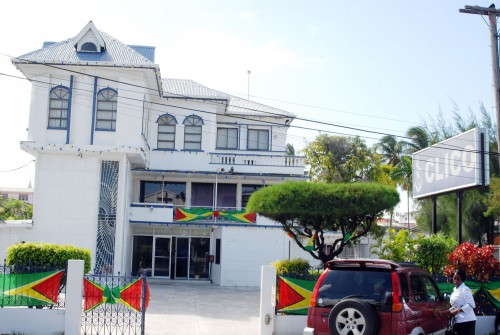In the worst case scenario of liquidation, the liabilities of CLICO (Guyana) will exceed its assets by $11.9 billion dollars, Judicial Manager, Maria van Beek said in a report submitted to the High Court yesterday.

In a highly anticipated report she also strongly criticized the manner in which the insurance company was run.
A best case presentation at liquidation shows the liabilities exceeding assets by $8.1B, the Judicial Manager said, emphasizing that there are ongoing concerns as it relates to the company’s assets and liabilities
Based on an investigation by Nizam Ali & Company, van Beek said that as a going concern, the book value of the company’s assets and liabilities shows the net asset position of the company is approximately -$1.6B. She said that given the likely impairment of the investment in CLICO (Bahamas) valued at $7.1B and “assuming some write-off in the value of the remaining assets of the company”, the net deficit could rise to $11.9B should the company be wound-up. She stressed however that these estimates are dependent on the value of the long term liabilities produced by the actuary who is dependent on the policy data stored and compiled by the staff of CLICO (Trinidad) who were subcontracted to perform the work. CLICO (Bahamas) was last week ordered wound up by a judge in Nassau. It was the placing of this business into liquidation that precipitated the placing of CLICO (Guyana) under judicial management. The final position of CLICO (Bahamas) showed its liabilities exceeding its assets by US$18M.
Chief Justice Ian Chang yesterday requested additional information on CLICO (Guyana’s) statutory fund – money set aside to cover needs in each class of insurance. He said that more information is needed in relation to the particulars of the fund, noting that the Judicial Manager must provide information on all the lines of businesses that CLICO (Guyana) conducts, which relates to the various categories of insurances such as accident, fire and motor.
Justice Chang then granted the Judicial Manager, who is also the Commissioner of Insurance, leave to file a further report that would be reflective of the entire financial position of the company.
In reporting on the company’s statutory fund, van Beek, has said that when the necessary calculation is done for the Actuary’s report, it is expected that there would be insufficient funds to cover all classes of business. She stated that it is possible however that some classes of business could be adequately funded. However, she said that there was insufficient time to do this analysis, adding that The [Insurance] Act provides insurers with up to six months to revise their statutory funds following the financial end of year.
CLICO (Guyana) entered an appearance in the court matter yesterday through its attorney, Roysdale Forde, signalling a possible challenge to the wind-up application before the court, and even a challenge to the contents of the report by the Judicial Manager.
The company is to file a formal entry of appearance within a few days. CLICO (Guyana) had opted out of the court proceedings prior to yesterday’s hearing, but the company is permitted by law to enter an appearance and challenge the wind-up application.
Van Beek also revealed yesterday in her report that CLICO (Guyana) commenced the preparation of an information memorandum for distribution to interested parties with the intention of determining whether the company or parts of its business could be sold. She noted that despite the reported difficulties of the company, interest has been expressed by local insurers.
“… I would like to seek the permission of the court to fully explore this by sharing information on the insurance business of the company with these parties and reporting back to the court”, van Beek said.
She stated that the sale of the local assets of the company would allow greater certainty with regard to the best possible treatment of the company’s policyholders. She theorized that it may for example permit a scheme whereby the viable parts of the business can be transferred to one or more local insurer and the remaining policies could be paid up to an amount to be determined and that the larger policies could be repaid over a period of time under terms to be agreed with the government and/ or parties, policyholders and the company. The government has said that no policyholder or investor will lose as a result of the CLICO debacle.
Generally poor

Van Beek lamented the state of the company’s documentation in her report, calling it “generally poor”. She said that based on the documents reviewed to date and a review of the investment decisions made by the company, “it appears that any assessment of the appropriateness of the investments in group subsidiaries was ineffectual.” She noted that this is of particular concern given that two of the Directors are also Directors on the board of CLICO(Bahamas) Ltd.
She said it does not appear that there were clear lines of communication between the actuary, management and the board. Further, she said discussions on critical assumptions for the actuarial valuation of the long-term liabilities do not appear to have been properly documented.
“While the investment in The Bahamas appeared liquid on the company’s books, the directors should have been aware of the high level of liquidity risk that the investments in The Bahamas entailed in recent years. There was also some common directorship with Caribbean Resources Ltd”, the Judicial Manager continued.
She added “The Directors and management of the Company operated without a basic understanding of managing an insurance business or pursued a strategy that has resulted in significant losses to the Company. This has jeopardized the ability of the company to meet its policyholder obligations”.
She stated that as at February 28, 2009, the company had approximately $1.7B in Executive Flexible Premium Annuity (EFPA) and Flexible Premium Annuity (FPA) claims outstanding and approximately $382 million in other claims outstanding. But, she noted that at least a further $5.7B in EFPA and FPA claims were submitted.
She also said in the report that if additional time is permitted she intended to instruct Nizam Ali to review the claims paid by the company during 2009 “and to determine whether any preferential disbursement was made”. During a run on CLICO (Guyana) in February after it was reported that Trinidad was bailing out its parent company, C L Financial, CLICO (Guyana) sold its Berbice Bridge bonds to the New Building Society to fund the surrenders of policies and investments. Questions have been raised about who cashed in on this.
According to the report, several non-essential agencies in Rose Hall, Bartica, Parika and Georgetown were closed in an effort o save costs, since the closure of these offices it expected to save the company at least $2.4 million per month.
The report stated that the employment and services of 40 permanent staff and 3 contractual and non-essential staff were also terminated in an effort to reduce costs; the expected savings related to the basic salary costs totalled $5.85M per month or approximately 40 percent of the total basic payroll. She said that the personnel were largely associated with the sale and marketing of insurance business and in all cases their positions were not essential for the effective and economic functioning of the company.
Cost assessments
She noted that they were paid severance on and after 27th March 2009 in accordance with the labour laws of Guyana, adding that the remaining staff has been retained at this time to service existing policyholders and assist the Judicial Manager in protecting the interest of policyholders of the company.
On the issue of the termination of services provided by Premium Security Services Inc. (PSSI), a subsidiary of CL Financial Ltd, she said that it was found that no contract existed for the provision of this service nor was the service secured under normal business considerations such as cost assessments.
According to van Beek, it became necessary to replace these services on 24th April due to deliberate delinquency on the part of a senior employee of PSSI. She said that investigations revealed that PSSI owes CLICO (Guyana) about $243 million and that despite being requested to repay this amount, PSSI has refused. RK Security Services have since been temporarily retained as replacement, she added.
The Judicial Manager reported that an investigation into CLICO (Guyana) investments with Caribbean Resources Ltd. and PSSI, both subsidiaries of CL Financial, reveals that both companies have little or no ability to repay the loans from the company.
“Over the years they have been largely dependent on the company to provide cash for both these organizations to function. All support to both companies has ceased since my appointment as Judicial Manager, and efforts are being made to recover the loans”, van Beek stated.
Further, she added that it appears unlikely that the investments totalling $2.4B would be recovered. She said too, that the report by Nizam Ali & Company estimates a recovery of approximately $402M, adding that any shortfall is guaranteed by the parent company CL Financial.
In addition, she reported that CLICO Guyana is wholly dependent on CLICO Trinidad to produce information and accounting information, and that this has caused some delays during the reporting period. Further, she said that any data problems have to be discussed with personnel in Trinidad.
As an illustration of the state of the company’s investments, the going concern value is $7.5b but in the liquidation worst case scenario the investments are reduced to $344m – the difference representing the investment in The Bahamas company.
She revealed that on the announcement by Trinidad on January 30, 2009 that some assets of C L Financial were being taken over CLICO (Guyana) “began experiencing heavier than normal surrenders. As at 28th February 2009, $1.5 billion in claims were paid during 2009 and $1.6 billion in claims remain outstanding on 28th February 2009”.
In an affidavit accompanying the report, van Beek noted that Winston Ramalho, claiming to be a director of CLICO (Guyana) had filed a motion seeking her removal as judicial manager. She averred that the motion was invalid and authorized and she had filed an affidavit in answer seeking to have it struck out and dismissed.




